NIV Application Commentary | NIVAC: New Testament, 20 vols.
Digital Logos Edition
This collection contains only the New Testament commentaries. The commentaries on the Old Testament are available separately in the NIV Application Commentary: Old Testament.
A thought-provoking commentary series on the New Testament
This award-winning series helps you understand the original meaning of the biblical text in its original context. All the elements of traditional exegesis—in concise form—are discussed. But the authors don’t stop there—they bridge the gap between the world of the Bible and the world of today, between the original context and the contemporary context, by focusing on both the timely and timeless aspects of the text.
The authors dwell on the contemporary significance of the Bible by focusing on contemporary contexts in which the Bible can be applied today.
A brand-new abridged version of the NIVAC is becoming available! Pre-order the NIV Application Commentary One-Volume edition, set for release in August 2024!

The primary focus of the NIV Application Commentary is to help you with the difficult but vital task of bringing an ancient message into our postmodern context. The series assists you through the process of moving from the original meaning of a passage to its contemporary significance.
How the NIVAC: New Testament is structured for your benefit
Each passage is treated in three sections:
1. Original Meaning
After reading this section, you will understand the problems, questions, and concerns of the original audience and how the biblical author addressed those issues. This understanding is foundational to any legitimate application of the text today.
2. Bridging Contexts
This section provides a bridge between the context in which the passage is written and where it is relevant in the world of today, focusing on God’s Word as both timely and timeless. When the first two sections are read together, you should have a strong sense of moving from the world of the Bible to the world of today.
3. Contemporary Significance
This section allows the biblical message to speak with as much power today as it did when it was first written. You may ask: How can you apply what you learned about Jerusalem, Ephesus, or Corinth to our present-day needs in Chicago, Los Angeles, or London? Answering this requires a process:
- Identify contemporary situations, problems, or questions that are comparable or analogous to those faced by the original audience
- Look at personal applications, as well as the implications for society and culture at large
- Caution against any difficulties you might encounter in seeking to apply the passage
Other helpful features
- Detailed footnotes point toward other scholarly works for further reading and research
- A lengthy bibliography is included in each volume
- The NIV Application Commentary will appear whenever you run Passage Guides and other reports in Logos Bible Software
- All Scripture references are linked directly to the Bibles in your digital library
Articles that feature the NIVAC
The NIV Application Commentary series doesn’t fool around. It gets right down to business, bringing this ancient and powerful Word of God into the present so that it can be heard and delivered with all the freshness of a new day, with all the immediacy of a friend’s embrace.
It is encouraging to find a commentary that is not only biblically trustworthy but also contemporary in its application. The NIV Application Commentary will prove to be a helpful tool in the pastor’s sermon preparation. I use it and recommend it.
—Charles F. Stanley, pastor, First Baptist Church of Atlanta
The NIV Application Commentary series promises to be of very great service to all who preach and teach the Word of God.
—J. I. Packer, Regent College
This series promises to become an indispensable tool for every pastor and teacher who seeks to make the Bible's timeless message speak to this generation.
—Billy Graham
The NIV Application Commentary is an outstanding resource for pastors and anyone else who is serious about developing 'doers of the Word.'
—Rick Warren, pastor of Saddleback Valley Community Church and author of Purpose Driven Life
If you want to avoid hanging applicational elephants from interpretive threads, then the NIV Application Commentary is for you! This series excels at both original meaning and contemporary significance. I support it one hundred percent.
—Howard G. Hendricks, Dallas Theological Seminary
The NIV Application Commentary will be a great help for leaders who want to understand what the Bible means, how it applies, and what they should do in response.
—Stuart Briscoe, pastor, Elmbrook Church
This is the pulpit commentary for the twenty-first century.
—George K. Brushaber, president, Bethel College and Seminary
The NIV Application Commentary builds bridges that make the Bible come alive with meaning for contemporary life.
The NIV Application Commentary meets the urgent need for an exhaustive and authoritative commentary based on the New International Version. This series will soon be found in libraries and studies throughout the evangelical community.
—Dr. James Kennedy, Ph. D. Senior Minister, Coral Ridge Presbyterian Church
The NIV Application Commentary series helps pastors and other Bible teachers with one of the most neglected elements in good preaching—accurate, useful application. Most commentaries tell you a few things that are helpful and much that you do not need to know. By dealing with the original meaning and contemporary significance of each passage, the NIV Application Commentary series promises to be helpful all the way around.
—Dr. James Montgomery Boice, Tenth Presbyterian Church
Here, at last, is a commentary that makes the proper circuit from the biblical world to Main Street. The NIV Application Commentary is a magnificent gift to the church!
—R. Kent Hughes, pastor, College Church, Wheaton, Illinois
This series dares to go where few scholars have gone before—into the real world of biblical application faced by pastors and teachers every day. This is everything a good commentary series should be.
—Leith Anderson, pastor, Wooddale Church
Here at last is a commentary which is not only academically well informed but which helps the contemporary reader hear God’s Word and consider its implications: scholarship in the service of the Church.
—Arthur Rowe, Spurgeon’s College
- Title: NIV Application Commentary: New Testament
- Publisher: Zondervan
- Volumes: 20
- Pages: 9,376
- Format: Logos Research Edition
- Resource ID: {5EE4B9AE-743E-4024-9829-717C6A3C3AA0}
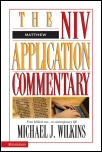
Matthew
- Author: Michael J. Wilkins
- Publisher: Zondervan
- Publication Date: 2004
- Pages: 1,008
The importance of the Gospel of Matthew in church history cannot be overstated. For Jewish readers, it affirmed the Messiahship of Jesus, referring consistently to the Scriptures to establish his credentials. For Gentile disciples, it provided powerful and dramatic support of their inclusion in God’s kingdom. The cross of Christ had removed the division between Jew and non-Jew, and through Matthew’s writings, we see Israel’s God drawing the entire world to himself through Jesus.
“The Gospel according to Matthew . . . Was the most widely read and frequently used of any of the four Gospels in the formative years of the church,” writes Michael Wilkins. In this volume of the NIV Application Commentary, Wilkins explains Matthew’s broad appeal not only to his ancient readers, but also to us today. Exploring the links between the Bible and our own times, Wilkins shares perspectives on Matthew’s Gospel that reveal its enduring relevance for our twenty-first century lives.
Michael J. Wilkins (Ph.D., Fuller Theological Seminary) is dean of the faculty and professor of New Testament language and literature at Talbot School of Theology, Biola University, and the author of several books.
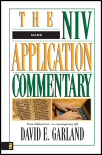
Mark
- Author: David E. Garland
- Publisher: Zondervan
- Publication Date: 1996
- Pages: 656
When it comes to living the Christian life, beginnings are better than endings. That may be one of the most important lessons that the Gospel of Mark, by its very structure, teaches us.
Looking at life in terms of endings often leads to discontent, neuroses, and despair. We always want to win more, make more, succeed more. More is an insatiable taskmaster.
But the Gospel of Mark says the better way is to focus on beginnings. It gives answers; it gives meaning to suffering; it restores hope as the queen of virtues.
Mark displays Jesus Christ as the New Beginning, giving us all the chance to start over against at any time. The Gospel of Mark, itself, starts abruptly and really has no ending, showing that Jesus makes it possible for the story of God, working in human history and in the church, to go on and on.
David Garland (Ph.D., Southern Baptist Theological Seminary) is William B. Hinson Professor of Christian Scriptures and associate dean for academic affairs at George W. Truett Seminary, Baylor University. He is the New Testament editor for the revised Expositor's Bible Commentary and the author of various books and commentaries, including Mark and Colossians & Philemon in the NIV Application Commentary, and the article on Mark in the Zondervan Illustrated Bible Backgrounds Commentary. He and his wife, Diana, reside in Waco, Texas.
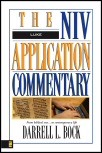
Luke
- Author: Darrell L. Bock
- Publisher: Zondervan
- Publication Date: 1996
- Pages: 640
Today’s world is more fragmented than ever. Diversity often becomes the rallying cry for what is in truth separatism and alienation. The multiplied voices of disunity clamor with increasing volume—yet they are nothing new. It was on a fractured planet that Jesus Christ lived and ministered, and it is on this same planet two thousand years later that he continues to unite and heal the fault lines of shattered humanity.
This is the message of Luke’s Gospel. It is a Gospel that crosses the borders between Jews and Gentiles, bringing together the unlikely and the disenfranchised under the brotherhood and lordship of one King, Christ. With carefully researched detail, Luke the historian presents an account of Jesus that is filled with meaning and promise for the entire world. It proclaims wholeness and restoration of humanity’s broken heart through inclusion into God’s kingdom.
Exploring the links between the Bible and our own times, Darrell L. Bock shares perspectives on the Gospel of Luke that reveal its enduring relevance for our twenty-first century lives.
Darrell L. Bock (Ph.D., University of Aberdeen) is professor of New Testament at Dallas Theological Seminary.
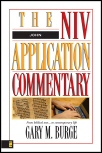
John
- Author: Gary M. Burge
- Publisher: Zondervan
- Publication Date: 2000
- Pages: 624
The Gospel of John tells us the story that is the foundation of the distinctive teaching of Christianity. It provides all the elements necessary to see the full picture of the person and work of Jesus: a human Christ to redeem us, a divine Christ to reveal God’s nature, and a powerful, Spirit-filled Christ to help us lead holy lives. John shows these aspects in a mysterious, literate way that beguiles and reveals as it pulls us deeper and deeper into the mystery of who God is.
This commentary unveils, into today’s terminology, the deeply satisfying portrait of Christ painted in the Gospel of John.
Gary M. Burge (Ph.D., King's College, Aberdeen University) is a professor of New Testament in the Department of Biblical & Theological Studies at Wheaton College and Graduate School. Gary has authored a number of books including commentaries on John and the letters of John in the NIV Application Commentary Series. He also specializes in the Middle East, its churches and its history in the Hellenistic period. His most recent book is Whose Land? Whose Promise?, which received a number of awards from national journals.
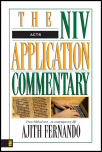
Acts
- Author: Ajith Fernando
- Publisher: Zondervan
- Publication Date: 1998
- Pages: 656
The very name “book of Acts” implies that Christianity is anything but passive. Making a quick and continuous connection between faith and action, the first-century church grew from a handful of Jewish believers into a movement that, sweeping far beyond the confines of Judea, set the entire Roman Empire ablaze with faith.
Faith and action: that inseparable link is a golden thread running through Acts, and it should weave through our own lives as well. While the world today is very different from what it was 2,000 years ago, one thing hasn’t changed: God’s heart for lost people. As long as he continues to act on their behalf, he will call us to play an integral part in his deeds. Acts lifts us up out of the armchair and spurs us to kingdom action, trusting that God will be with us as surely as he was with Peter, Paul, John, and the infant church.
Exploring the links between the Bible and our own times, Ajith Fernando shares perspectives on the book of Acts that reveal its enduring relevance for our twenty-first century lives.
Ajith Fernando is national director of Youth for Christ in Sri Lanka and a Bible expositor with a worldwide ministry. He studied at Asbury Theological Seminary and Fuller Seminary, and presently leads the English language minatory in Colombo. He is active in Colombo Theological Seminary as chairman of the academic affairs committee.
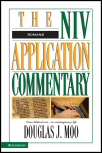
Romans
- Author: Douglas J. Moo
- Publisher: Zondervan
- Publication Date: 2000
- Pages: 544
Our culture does not encourage thoughtful reflection on truth. Yet living the gospel in a postmodern culture demands that Christians understand and internalize the truth about God and his plan for the world. Paul's letter to the Romans remains one of the most important expressions of Christian truth ever written. Its message forces us to evaluate who we are, who God is, and what our place in this world ought to be. Going beyond the usual commentary, this volume brings the meaning of Paul's great letter into the twenty-first century. Douglas Moo comments on the text and then explores issues in Paul's culture and in ours that help us understand the ultimate meaning of each paragraph. A final section suggests ways in which the eternal theology of Romans can be understood and lived out in our modern culture.
Douglas Moo is the Blanchard Professor of New Testament at Wheaton College. He holds a Ph.D. from the University of St. Andrews in Scotland. His work centers on understanding the text of the New Testament and its application today.
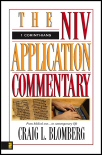
1 Corinthians
- Author: Craig L. Blomberg
- Publisher: Zondervan
- Publication Date: 1995
- Pages: 352
Although separated by nearly two thousand years of history, there are many similarities between the church in Corinth and the world of today. The Corinthian church was riveted by factions that threatened to tear it apart. Paul had to handle strong differences of opinion among the Christians on such topics as marriage, lawsuits, meat sacrificed to idols, worship, and Christian doctrine. Similarly, the world today—and all too often the church as well—is in danger of a terminal fragmentation, a new tribalism.
In the course of his commentary on this magnificent letter, Craig L. Blomberg details the issues Paul raises and provides expert analysis of each one of them. In each case the world’s wisdoms—human reason, unbridled freedom, litigation, no-fault divorce are modern equivalents—is contrasted with the values of God-given wisdom—purity, forgiveness, reconciliation, and mutual faithfulness. In this volume, discover not only the original meaning of 1 Corinthians, but also how Paul's message can speak powerfully today.
Craig L. Blomberg is distinguished professor of New Testament at Denver Seminary. He holds a Ph.D. from the University of Aberdeen, Scotland. He is the author, coauthor, or co-editor of fourteen books and more than eighty articles in journals or multi-author works. A recurring topic of interest in his writings is the historical reliability of the Scriptures. Craig lives with his wife and two daughters in Centennial, Colorado.
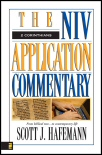
2 Corinthians
- Author: Scott J. Hafemann
- Publisher: Zondervan
- Publication Date: 2000
- Pages: 544
2 Corinthians, which is part of the NIV Application Commentary Series, helps readers learn how the message of 2 Corinthians can have the same powerful impact today that it did when it was first written. This volume is part of a series which explains the Bible's message by placing it in a modern context. This edition gives insight into both the author of the letter, Paul, and most strikingly, what it says about God.
Scott J. Hafemann, Ph.D., serves on the Gordon-Conwell faculty as the Mary French Rockefeller Professor of New Testament. Previously he was the Gerald F. Hawthorne Professor of New Testament Greek and Exegesis at Wheaton College.
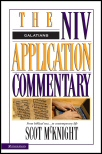
Galatians
- Author: Scot McKnight
- Publisher: Zondervan
- Publication Date: 1995
- Pages: 320
This volume in the NIV Application Commentary series shows readers how to bring an ancient message into a modern context. Discover not only the original meaning of Galatians, but also how the message of Galatians can speak powerfully today.
[McKnight’s commentary on Galatians] takes exegesis seriously and still has space left for considerations of what the text is saying in today’s world.
—John Wilderspin, First Lobo Baptist Church, Lobo, Ontario, in the Journal of the Evangelical Theological Society
Scot McKnight (Ph.D., Nottingham) is Karl A. Olsson professor of religious studies at North Park College, Chicago, Illinois. In addition to the volume on Galatians as part of the NIV Application Commentary series, he is author of numerous books and articles, and editor of Dictionary of Jesus and the Gospels.
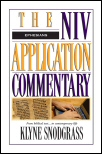
Ephesians
- Author: Klyne Snodgrass
- Publisher: Zondervan
- Publication Date: 1996
- Pages: 384
Paul’s letter to the Ephesians shines with the brilliant reality of what being a Christian really means. We are far more than forgiven—we have been changed. Not just the way we live, but the very source and nature of our lives are different. In Christ, we are new creations, righteous, fit for fellowship with God, and even now seated “with him in the heavenly realms” (Eph. 2:6).
But what practical implications does this radical transformation have for us? In what ways does living in God’s grace affect our daily conduct? In Ephesians, Paul connects our identity in Christ to our lifestyles. We are God’s workmanship, he says; let us live out who we are. Whether the setting is the home, the church, or the marketplace, our lives ought to reflect our union with Christ.
Exploring the links between the Bible and our own times, Klyne Snodgrass shares perspectives on the book of Ephesians that reveal its enduring relevance for our twenty-first century lives.
Klyne Snodgrass (Ph.D., University of St. Andrews) is professor of biblical literature and holder of the Paul W. Brandel Chair of New Testament Studies at North Park Theological Seminary.
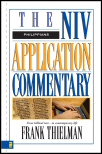
Philippians
- Author: Frank Thielman
- Publisher: Zondervan
- Publication Date: 1995
- Pages: 256
Sprinkled with cherished and memorable verses, Paul’s letter to the Philippians is for many a favorite book of the Bible. Written from prison, it serves as Paul’s missionary report and thank you to a faithful church, as well as a warm pastoral exhortation to make the advancement of the gospel their top priority. Paul models and calls for joy in the midst of suffering, warns against dangerous false teaching, and calls for Christian unity grounded in the example of the Lord Jesus.
In a day often marked by selfish ambition, spiritual laziness, disunity, and joyless living, Philippians contains an eminently practical message for contemporary Christians. Exploring the links between the Bible and our own times, Frank Thielman skillfully draws out the timeless truths of this loving letter in a lucid and powerful way.
Frank Thielman (Ph.D., Duke University) is Presbyterian professor of divinity at Beeson Divinity School, Samford University, in Birmingham, Alabama.
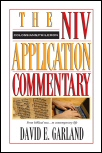
Colossians and Philemon
- Author: David E. Garland
- Publisher: Zondervan
- Publication Date: 1998
- Pages: 400
This volume in the NIV Application Commentary series discusses the meaning of the text of Colossians and Philemon in its biblical context and then applies it to contemporary situations. Discover how Colossians and Philemon can have the same powerful impact today that they did when Paul first wrote them.
David Garland (Ph.D., Southern Baptist Theological Seminary) is William B. Hinson Professor of Christian Scriptures and associate dean for academic affairs at George W. Truett Seminary, Baylor University. He is the New Testament editor for the revised Expositor's Bible Commentary and the author of various books and commentaries, including Mark in the NIV Application Commentary, and the article on Mark in the Zondervan Illustrated Bible Backgrounds Commentary. He and his wife, Diana, reside in Waco, Texas.
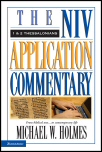
1 & 2 Thessalonians
- Author: Michael W. Holmes
- Publisher: Zondervan
- Publication Date: 1998
- Pages: 304
Paul’s letters to the Thessalonians address fundamental questions about death, about Christ’s return, and about the nature of holy living. This volume in the NIV Application Commentary series helps readers learn how Paul’s message to the Thessalonians can have the same powerful and transformative impact today that they did when first written.
Michael W. Holmes (Ph.D., Princeton Theological Seminary) is professor of biblical studies and early Christianity at Bethel College in St. Paul, Minnesota.
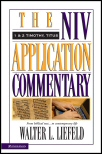
1 & 2 Timothy, Titus
- Author: Walter L. Liefeld
- Publisher: Zondervan
- Publication Date: 1999
- Pages: 384
In the volume on 1 & 2 Timothy and Titus, Walter Liefeld reveals the context and meanings of Paul's letters to two leaders in the early Christian church. He explores the present-day implications of these epistles and helps the reader to accurately apply the principles they contain to contemporary issues.
Walter L. Liefeld is distinguished professor emeritus of New Testament at Trinity Evangelical Divinity School and is the author of Luke in the Expositor's Bible Commentary series.
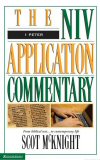
1 Peter
- Author: Scot McKnight
- Publisher: Zondervan
- Publication Date: 1996
- Pages: 304
In Scot McKnight’s volume on 1 Peter, learn not only what Peter said to his audience in the first century but also how what he taught can be applied today in this volume of the NIV Application Commentary Series.
Scot McKnight (PhD, Nottingham) is Karl A. Olsson professor of religious studies at North Park College, Chicago, Illinois. He is author of Galatians in the NIV Application Commentary series and is editor of Dictionary of Jesus and the Gospels.
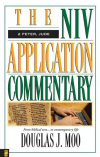
2 Peter, Jude
- Author: Douglas J. Moo
- Publisher: Zondervan
- Publication Date: 1997
- Pages: 320
The apostles Peter and Jude wouldn’t have made good postmodernists. They insist that there is such a thing as absolute, non-negotiable truth, as well as error and deception. They speak of false doctrines and those who teach them as if they actually believe that eternity hangs in the balance and that God, far from shrugging his shoulders like a good relativist, takes the matters of truth and spiritual authority very seriously.
Today the fiery, unapologetic language of 2 Peter and Jude can open our eyes to stark spiritual realities. Like few other apostolic writings, these two letters shake us awake to the vital necessity of embracing the true gospel and transmitting it undistorted. The message is as countercultural as possible, and profoundly timely.
Douglas Moo is the Blanchard Professor of New Testament at Wheaton College. He holds a Ph.D. from the University of St. Andrews in Scotland. His work centers on understanding the text of the New Testament and its application today.
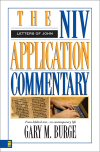
The Letters of John
- Author: Gary M. Burge
- Publisher: Zondervan
- Publication Date: 1996
- Pages: 272
The letters of John speak words of encouragement and reproach to the grave concerns of the early church, yet reveal a God who not only loves his people, but wants them to experience life abundantly. Gary M. Burge’s commentary on the letters of John focuses on understanding the significance of John’s letters when he wrote them, and conveys the power they still have today.
Gary M. Burge (Ph.D., King's College, Aberdeen University) is a professor of New Testament in the Department of Biblical & Theological Studies at Wheaton College and Graduate School. Gary has authored a number of books including commentaries on John and the letters of John in the NIV Application Commentary Series. He also specializes in the Middle East, its churches and its history in the Hellenistic period. His most recent book is Whose Land? Whose Promise?, which received a number of awards from national journals.
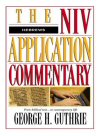
Hebrews
- Author: George H. Guthrie
- Publisher: Zondervan
- Publication Date: 1998
- Pages: 480
Hebrews covers diverse topics—from Christ’s priesthood to the faith of prominent biblical figures. In this volume on Hebrews, Guthrie brings the diversity of themes in Hebrews together, and shows how Hebrews is not only theologically significant, but also has something to say to the church today.
George H. Guthrie (Ph.D., Southwestern Baptist Theological Seminary) serves as the Benjamin W. Perry Professor of Bible at Union University in Jackson, Tennessee. As a specialist in New Testament and Greek, he is the author of numerous articles and four books.
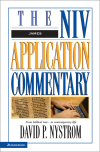
James
- Author: David P. Nystrom
- Publisher: Zondervan
- Publication Date: 1997
- Pages: 352
Straight to the point, practical, affirming, convicting—that’s the book of James. In it, we see a picture of early Christians wrestling to apply the teachings of Jesus to their everyday lives. And we see a community plagued by divisiveness and hypocrisy, with an emphasis on wealth and status. James pulls no punches addressing these issues, calling for a faith that shows itself in moral actions: in speech, in interpersonal relationships, in economic and social justice. He also lays out a theology of the redemptive value of suffering.
In our day when the behavior and attitudes of professed Christians are often not much different from the surrounding culture, in our society of great wealth, and in our culture that abhors suffering, the challenging message of James is greatly needed. Exploring the links between the Bible and our own times, David Nystrom shares perspectives on the book of James that reveal its enduring relevance for our twenty-first century lives.
David Nystrom has been at William Jessup University for two years. He is an adjunct professor of New Testament at Fuller Theological Seminary and at Western Seminary. He is married to Kristina and they have one daughter, Annika, who is nine years old. Dave is also the author of The History of Christianity.
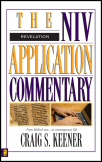
The book of Revelation can be intimidating to encounter and daunting to apply. Yet in his volume on Revelation, Craig S. Keener reveals the transitions, the structure, and the benefits of learning to read the Bible in context. He helps readers understand apocalyptic literature not only for its own sake, but also for the benefit of the church and for practical application in the lives of ordinary Christians.
Craig S. Keener (Ph.D., Duke University) is professor of biblical studies at Eastern Baptist Theological Seminary.
Reviews
38 ratings

circtridr
7/12/2024
Joseph E
3/25/2023

Randy
6/14/2022
As I understand it, the fundamental premise of this series, is that there's a huge gap between what the Bible meant to the original readers, and what it means for us today. This allows the authors to introduce a fine way of setting aside the word of God, for the sake of today's worldly culture and traditions. As an example, see my review of the pastoral epistles volume: https://faithlife.com/reviews/259142.
Eddy Pearson
4/8/2022
Jordan Cavanaugh
11/22/2021

William Pankey
7/25/2021

Charles C.G. Miller
11/9/2020
I am an experienced lay Bible study teacher for adults. I am so tired of working with books with 10 DVD lessons or 10 chapters in a $5 book. I need more meat in my sandwich. The NIVAC is not technical and does not use Greek or Hebrew without explaining what it means. It is not a "Sermon in a box" commentary for pastors. It is a really good explanation of the value of each book and why we should study it..Each NIVAC book divides the Biblical book into practical sections and then 4 subsections for each sections. 1. The NIV text. 2. The "Original Meaning." 3. "Bridging Contexts" to help us understand what is in the section. 4. "Contemporary Significance" to help us understand the message for today. I love the Word Biblical Commentary, or Barclay or Wiersbe; but NIVAC is my go to series whether I am looking for a book for a teacher or a book for the whole class to buy.Ray Brown
2/1/2019

Faithlife User
2/8/2018
Phil Meulman
8/9/2017